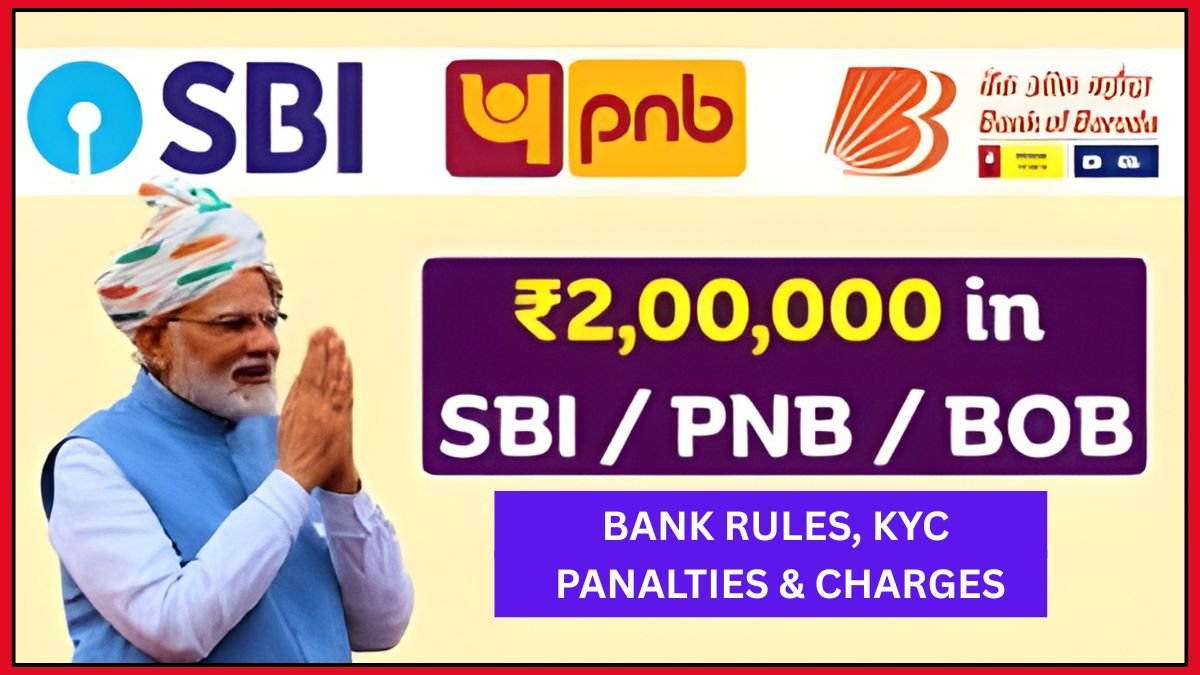Depositing ₹2,00,000 in a bank account might seem routine — but for SBI, PNB, BOB and other major public sector banks, such amounts often trigger a closer look: stricter KYC checks, reporting obligations, and even penalties if rules are not adhered to.
In this article, we unpack:
- What the law and RBI say about large deposits
- What KYC documentation is required
- Potential penalties for non-compliance
- Recent changes or updates you should know
- Practical tips to handle large deposits safely
Let’s dive in.
1. Why ₹2,00,000 Matters: Big Deposit Rules in Banks
Banks and regulators often treat large deposits differently. Some key points:
- Cash Transaction Reporting: Banks are required to report large cash deposits and withdrawals (for example, ₹10 lakh and above) to authorities. The threshold is much higher than ₹2,00,000, but repeated deposits or suspicious patterns might draw attention.
- KYC / Due Diligence: When you deposit or hold large sums, banks may request full KYC (identity, address, income proofs). If your account is not fully KYC-compliant, deposits may be refused, held in suspense, or made inactive.
- Source of Funds: For large sums, the bank may ask you to justify where the money came from (income, sale of property, gift, inheritance, etc.), especially if it doesn’t align with your profile.
- Inoperative / Dormant Accounts: If your account is inactive, banks may freeze or restrict it until you update KYC or reactivate it. Recently, RBI has allowed updating KYC via video or any branch or business correspondent to reactivate accounts.
So, depositing ₹2,00,000 is usually fine, but you should ensure your banking profile is fully updated.
2. KYC Requirements for SBI, PNB & BOB
To deposit large sums without hassle, your bank account should be fully KYC-compliant. Here’s what you may be asked:
Common Documents Required
- Identity Proof: Aadhaar card, PAN card, voter ID, passport, driving license
- Address Proof: Aadhaar, utility bills, passport, ration card, rent agreement
- Income / Source Proof: Salary slips, income tax return (ITR), bank statements, sale deed, gift deed
- Photograph: Recent passport size
- Nominee / Declaration Forms: To maintain proper documentation
Banks may also require enhanced KYC if deposits are large or account risk is higher.
Updates & Reactivation
If your account is become inactive or dormant, or if your KYC is incomplete, you may be asked to visit the branch, provide updated documents, or even complete video KYC under new RBI rules.
3. Penalties & Risks of Non-Compliance
Failing to maintain rules or provide required documentation can lead to:
- Reduced functionality: No withdrawals above certain limits, only cash-in allowed
- Account freezing / temporary suspension until KYC is updated
- Funds withheld in suspense or blocked
- Additional scrutiny and reporting to authorities
- Regulatory fines & compliance issues: Banks themselves can be fined for KYC non-compliance. For example, in 2023, RBI fined SBI and other banks for lapses in KYC norms and regulatory violations.
Therefore, if you deposit ₹2,00,000, ensure all your paperwork is accurate and up to date.
4. Recent Updates & Changes You Should Know
- RBI’s new rules for inoperative accounts: You can now update KYC via video, any branch, or business correspondent to reactivate dormant accounts.
- KYC onboarding reforms: RBI now allows non-face-to-face onboarding (e.g. video KYC) in certain cases.
- Penalty waivers for minimum balance: For example, SBI has waived penalty for not maintaining average monthly balance in many cases since 2020.
- Increased monitoring: Banks and regulators are more vigilant about large deposits and transactions, to fight money laundering or suspicious activity.
So the system is slowly getting more flexible for users, but vigilance is high.
5. Practical Tips: How to Safely Deposit ₹2,00,000
- Ensure full KYC ahead of time — don’t wait until deposit day
- Carry all documentation about source (sale deed, gift, income proof)
- Divide deposit if needed — multiple smaller deposits may help avoid hassle, but ensure it’s within legal norms
- Request deposit receipt and ensure the deposit reflects in your account promptly
- Maintain record — keep proof of where you got the money
- Avoid suspicious patterns — repetitive cash deposits without clear source attract attention
- For dormant accounts: first update KYC or reactivate account before large deposit
Depositing ₹2,00,000 in SBI, PNB or BOB is well within legal limits — but for smooth processing, make sure your account is KYC-compliant, you can justify your source of funds, and you are aware of penalties if rules aren’t followed.
Recent regulatory changes are making it easier for users to update KYC and revive dormant accounts, but banks will still scrutinize large deposits more than small ones.

